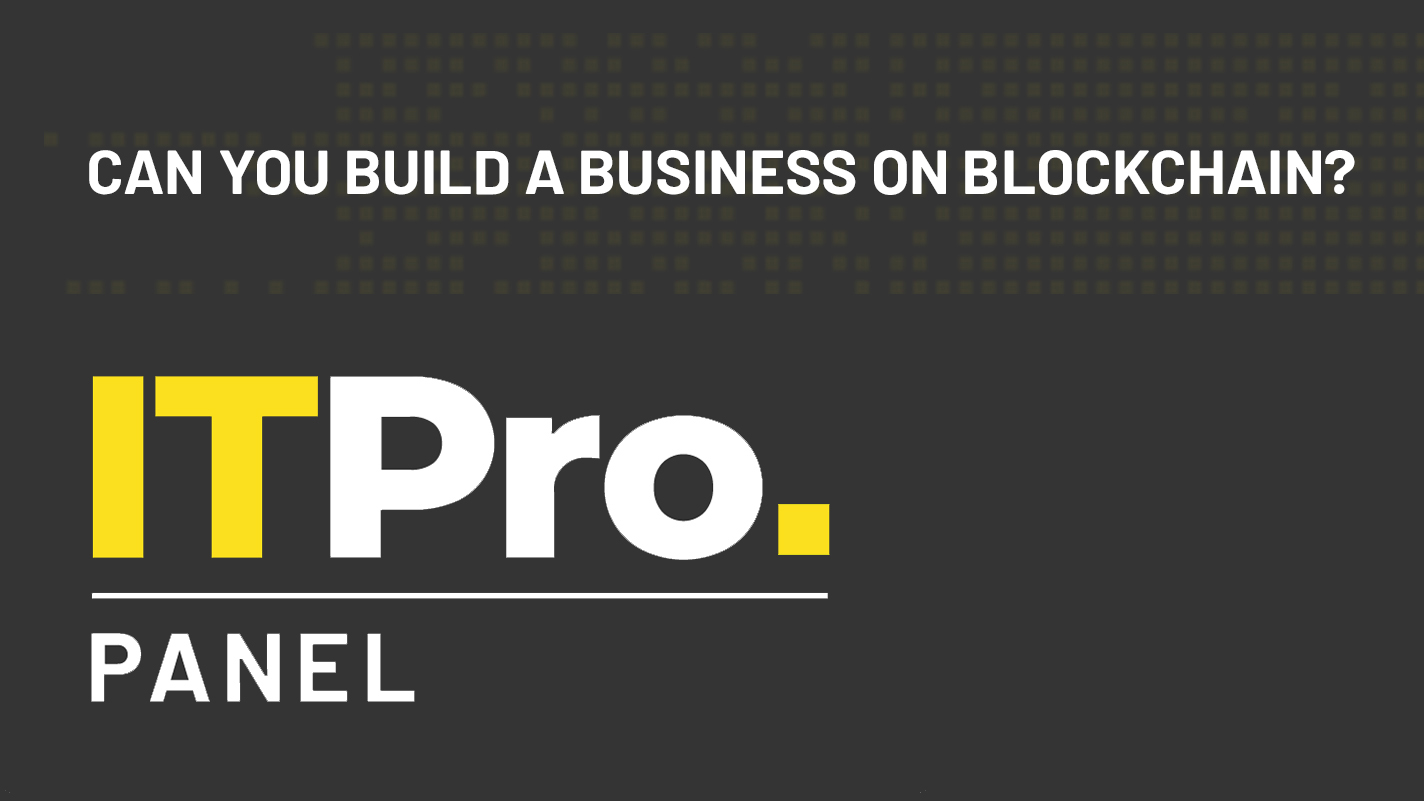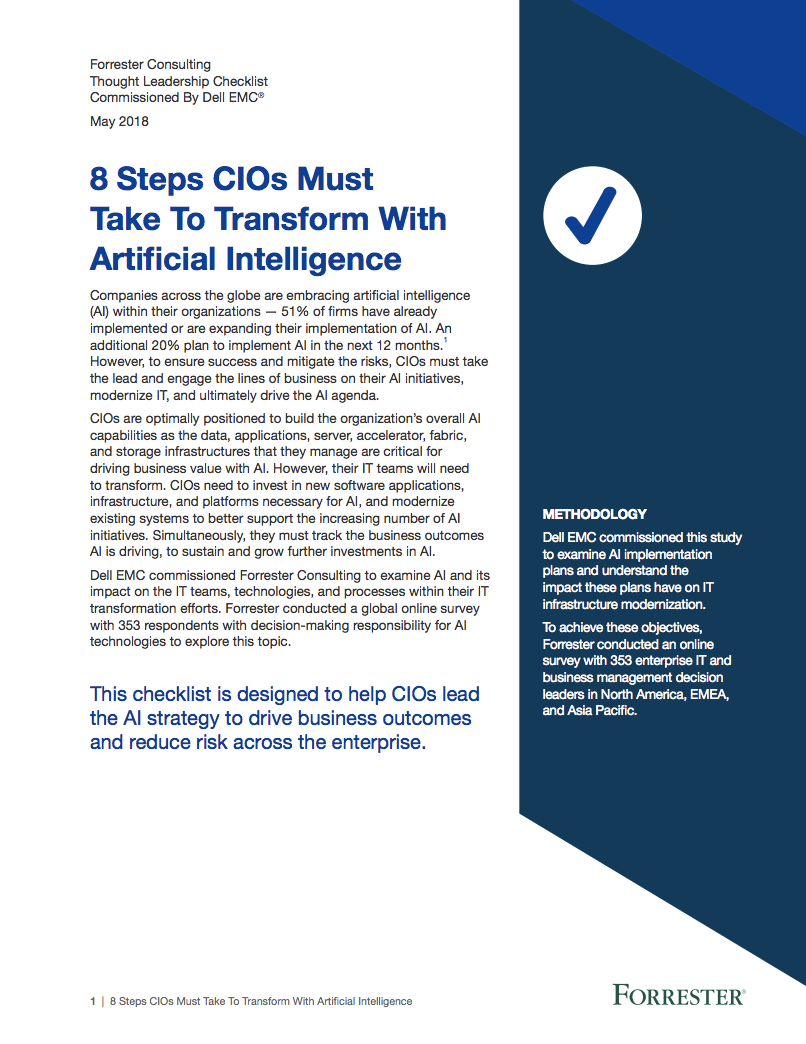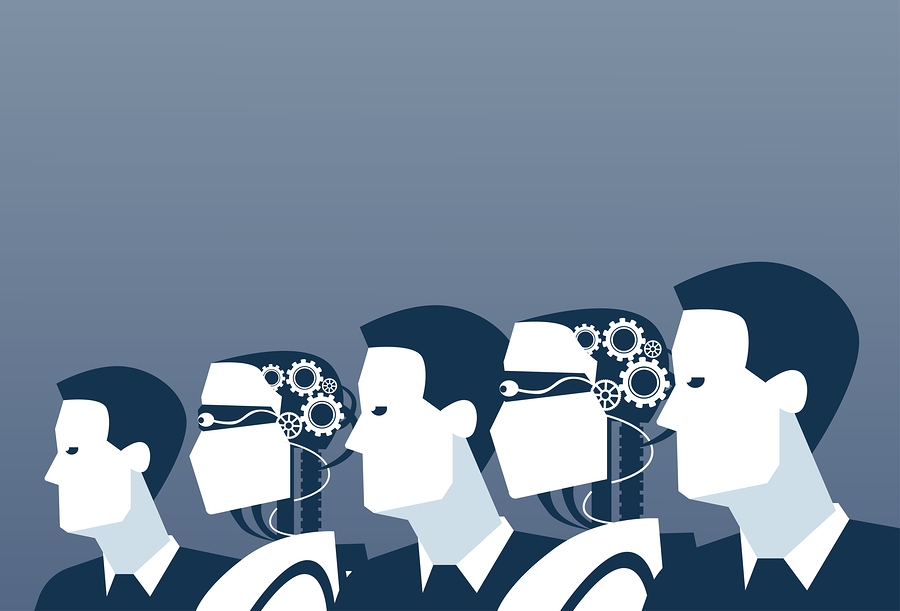AI and the CIO: How to develop a business case
Convincing executives to look past the hype and bluster is often the biggest challenge for IT leaders


Sign up today and you will receive a free copy of our Future Focus 2025 report - the leading guidance on AI, cybersecurity and other IT challenges as per 700+ senior executives
You are now subscribed
Your newsletter sign-up was successful
The use of artificial intelligence (AI) in business is moving quickly from a theoretical concept to operational reality. Analyst Gartner predicts 70 percent of organisations will boost their employees' productivity by integrating AI into the workplace by 2021.
Such growth potential means C-suite executives are keen for their organisations to explore this fast-emerging area. But while AI might be the talk of the boardroom, what does its emergence means for CIOs? If digital leaders truly believe AI will impact their organisations through 2019, they need to know how to communicate the benefits, and the likely challenges, the technology will bring.
Barry Libenson, global CIO at financial data company Experian, says that, regardless of industry, AI has a role to play, and that its important CIOs understand how this impact creates challenges. He says people skilled in AI - and the closely related areas of machine learning (ML) and deep learning - are the hardest to find.
Missing intelligence
"There is no such thing as experience in this area of emerging technology," he says. "There is a small handful of people who have AI or ML expertise - and it's a fraction of what we need in the industry right now based on demand. So, I think that's going to be something we're going to be talking about for the foreseeable future."
The skills gap around AI is not the only capability concern. While C-suite executives clamour to find professionals to make the most of emerging technology, other workers are concerned about the rise of AI. Estimates suggest more than half of all current workplace tasks will be performed by machines by 2025, according to the World Economic Forum.
Experts believe an effective balance between human and machine capability will be crucial, where organisations use emerging technology to augment their existing skills base. Richard Orme, CTO at Photobox Group, gives a good example of where AIs can help fill the gap and act as a productivity boon, rather than a worker-replacement tool
"Machines are good at making decisions without bias - they don't get tired and angry," he says. "Humans are good at coming up with ideas and exploring information, but we can be bad at making decisions from information. You can use AI to think about what problems you need to solve and free up your thinking time - the machine then becomes reinforcing in terms of augmenting human capability."
Sign up today and you will receive a free copy of our Future Focus 2025 report - the leading guidance on AI, cybersecurity and other IT challenges as per 700+ senior executives
Orme says his firm is already using AI creatively. "We're trying to figure out how we can help our customers build a photo book and the balance of how we inspire them, without taking away creative control. That's interesting because customers didn't want the process to be too short. AI can help us with some of those challenges.".
Next generation of data analysis
Evidence suggests CIOs in all sectors are exploring their options. Matt Harris, head of IT for Mercedes-AMG Petronas Motorsport, says AI and ML are on his team's agenda. Various departments are looking at emerging technologies and their potential impacts. While Harris recognises the power of technological advances, he also issues a word of caution.
"AI is a buzzword - at its heart, it's a new form of data analysis. Some of the tools and techniques are getting close to being able to do the human job better than a human, but you still need the clever person to create the right code," says Harris, emphasising how - while AI can lead to the replacement of some roles - the technology is more likely to be exploited in combination with IT talent, both in terms of internal staff and external partners.
"Some of the things we're doing around image recognition and some of the things we're doing with partners like HPE, Pure and Tibco are going to provide the differentiators between standing still - which, for us, means going backwards - or iterating and moving forwards."
Like Harris, Darren Curry, chief digital officer at NHS Business Services Authority (NHSBSA), says machine-learning technology provides a potential boon when it comes to information management. He explains that his organisation creates a huge amount of data and the potential to use emerging technology to make better use of that information cannot be ignored.
"We believe we can use the information we collect in ways that help support the future NHS workforce," he says. Those explorations are already underway. NHSBSA is using AI technology in its customer contact centre, with Amazon Alexa helping call centre operators manage non-essential calls relating to the European Health Insurance Card.
NHSBSA receives 4.7 million contacts from customers every year in its 600-seat contact centre in Newcastle. Curry says the priority is to ensure non-complex calls are dealt with automatically through AI. He says the technology has already helped support a 45% reduction in the number of calls passed to operators.
"Our aim wasn't to remove the operator from the process; it was about enabling the call-handling workers to be able to take more complex queries, where the people contacting us need more human responses," says Curry.
Revolutions can be boring
Julie Dodd, director of digital transformation and communications at Parkinson's UK, is another IT leader who is able to point to examples of where her organisation is using AI to create big benefits. The charity has a partnership with BenevolentAI, a specialist in the development and application of AI technology in the health sector. Parkinson's UK is using their machine-learning platform to search for drugs that might offer a potential cure to the condition.
Dodd suggests other CIOs must find use cases for AI in their organisations that help executives get past the hype and bluster surrounding emerging technologies. While machine-learning technology is already producing benefits for Parkinson's UK and the people it serves, Dodd says the potential for AI must be understood within the context to which it is being applied.
"Lots of people are going to say AI is the future of everything - and actually the truth is that there's loads of stuff that will be as revolutionary that's really boring to talk about, like implementing Agile processes," says Dodd.
"But for an organisation like ours, AI can be put to really good use processing big data sets - and some of those data sets are around clinical research, which humans are not good at processing, so that capability is fundamental to the future of our sector."

Mark Samuels is a freelance writer specializing in business and technology. For the past two decades, he has produced extensive work on subjects such as the adoption of technology by C-suite executives.
At ITPro, Mark has provided long-form content on C-suite strategy, particularly relating to chief information officers (CIOs), as well as digital transformation case studies, and explainers on cloud computing architecture.
Mark has written for publications including Computing, The Guardian, ZDNet, TechRepublic, Times Higher Education, and CIONET.
Before his career in journalism, Mark achieved a BA in geography and MSc in World Space Economy at the University of Birmingham, as well as a PhD in economic geography at the University of Sheffield.
-
 Researchers call on password managers to beef up defenses
Researchers call on password managers to beef up defensesNews Analysts at ETH Zurich called for cryptographic standard improvements after a host of password managers were found lacking
-
 Is there a future for XR devices in business?
Is there a future for XR devices in business?In-depth From training to operations, lighter hardware and AI promise real ROI for XR – but only if businesses learn from past failures
-
 Majority of CIOs concerned that cloud complexity exceeds human ability
Majority of CIOs concerned that cloud complexity exceeds human abilityNews Greater observability and rollout of automated systems are also needed to reduce IT team strain and burnout
-
 IT Pro Panel: Can you build a business on blockchain?
IT Pro Panel: Can you build a business on blockchain?IT Pro Panel Blockchain’s about more than just cryptocurrencies, but does it have a place in the enterprise?
-
 AI the most critical technology for CIOs over the next five years
AI the most critical technology for CIOs over the next five yearsAnalysis 60% of CIOs believe artificial intelligence and machine learning are the top critical future technologies
-
 8 steps CIOs must take to transform with artificial intelligence
8 steps CIOs must take to transform with artificial intelligenceWhitepapers A checklist to help CIOs lead their AI strategy
-
 Mayor of London hails capital's AI firms as he reveals smart city roadmap
Mayor of London hails capital's AI firms as he reveals smart city roadmapNews Sadiq Khan outlines plans to use more data and urges startups to solve social challenges
-
 IFS: Living wage increases put jobs at risk of automation
IFS: Living wage increases put jobs at risk of automationNews Rises in the lowest wages 'may make automation more attractive to employers'
-
 AI news: CBI urges creation of AI commission in 2018
AI news: CBI urges creation of AI commission in 2018News It underlines the need to analyse the impact of AI on the workforce
-
 How the cloud underpins Lush's entire digital strategy
How the cloud underpins Lush's entire digital strategyIn-depth Lush plans to make a splash with chatbots and may train staff with AI